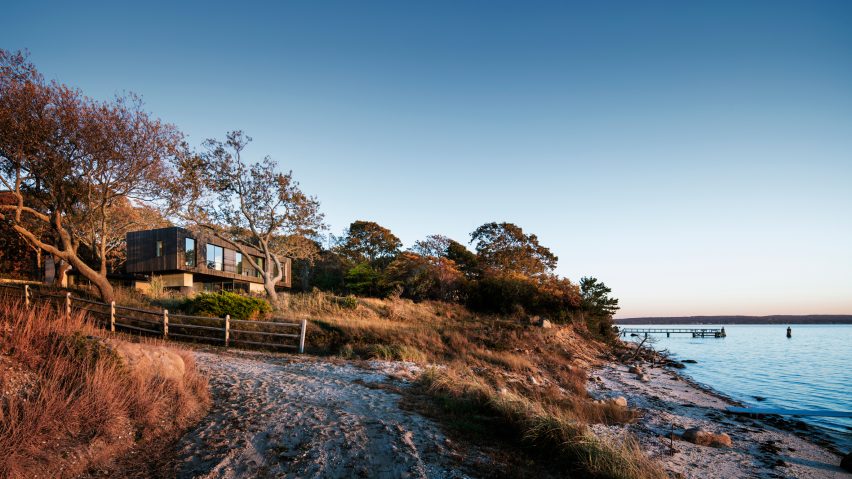US firm Leroy Street Studio has designed this cedar-clad retreat in Suffolk County, New York, to provide glimpses of nearby water on arrival and expansive views from inside.
The local architects designed Shore House for a sloped plot in North Haven, a village at the eastern end of Long Island. The aim was to maintain the link between the forest behind and a bay of the Peconic River at the front.
"The home was conceived of as a gateway for experiencing the passage from forest to sea," said the studio. "The approach was designed to guide the individual through a sequence of views revealing new perspectives of the house, sky, and water."
Part of the site was excavated to make way for the lower level, which is embedded into the slope and mostly hidden from view. The volume set on top features small windows where it is possible to see the ocean beyond.
Access to the residence is provided by a pathway that leads from the forest at the top of the plot. The path ends at a set of steps carved into the slope, which descend to the entrance. Once inside, large expanses of glazing set on the water-facing side of the residence open up to the bigger views.
"A cut in the earth offers entry to the house, followed by a sequence of interior and exterior spaces that slowly open to sweeping views of the bay," said Leroy Street Studio, which has previously completed a cedar-clad villa in the Hamptons.
The architects also wanted to ensure that the house blended in with its natural surroundings, so clad the top volume in cedar that was charred using an ancient Japanese technique known as shou sugi ban. This blackening process was also used for a residence in Houston and a home on a Massachusetts island.
Planting on the roof of the lower level continues the surrounding greenery. The architects said that both this, and embedding the storey into the hill, improve the insulation and energy efficiency of the house.
Along with creating a private retreat for the resident, the architects were also asked to design space to host large parties and events. Therefore, an open-plan lounge, kitchen and dining room on the lower floor wraps around and opens onto a sunken seating area.
At the centre of the outdoor space, a large masonry hearth supports the cantilevered end of the volume above. It is fitted with a fireplace surrounded by glazed black ceramic tiles.
A staircase leads from the lounge to the top floor, which is occupied by a cabana, a master bedroom and an ensuite bathroom – all with views of the water.
The architects chose textured and warm materials for the interiors. In the kitchen, wooden cabinets are combined with a white marble counter and splashback. Wooden stools with reddish leather seats provide dining space around the counters.
Photography is by Scott Frances.

